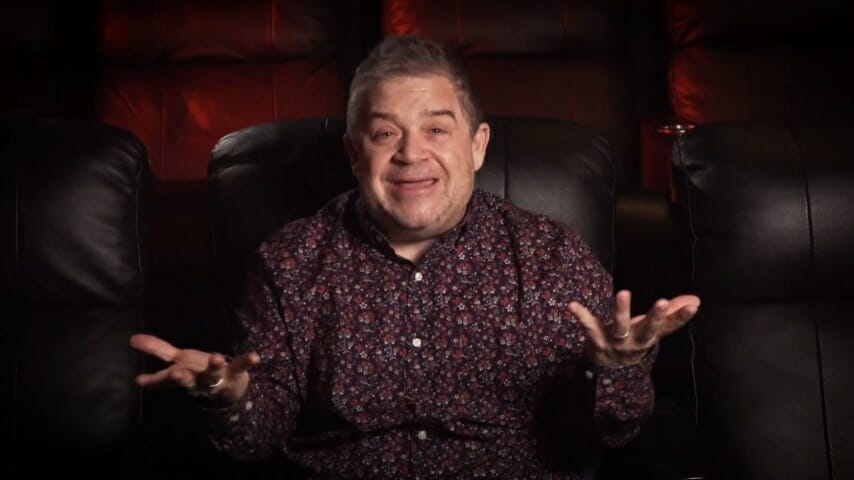Patton Oswalt Sees the Beauty in Bad Movies
The comedian talks about the B-movie marathon he's hosting this weekend.

Patton Oswalt’s a man of many roles, many voices, and countless talents: Depending on your life’s path, you might know him as the world’s biggest New York Giants obsessive in 2009’s Big Fan, the narrator in the long-running period sitcom-cum-’80s nostalgia piece The Goldbergs, the heart and soul of a chef-aspirant rat in Ratatouille, Omari Hardwick’s white voice in Sorry to Bother You, Charlize Theron’s drinking buddy in Young Adult, and of course a veteran comedian with fistfuls of specials and album releases under his belt.
Oh, and he’s a major cinephile, too, so much so that he up and decided to host his own mini movie fest on Shout! Factory TV. Patton Oswalt’s Six Pack Movie Marathon. will stream at Shout! Factory TV on Saturday, November 7, starting at 9 a.m. PT (noon ET). Lest the easily intimidated assume his cinephilia is rooted in fancy-pants high-falutin’ tastes, this half dozen collection comprises a whole bunch of schlock: Chopping Mall, Battle Beyond the Stars, Shriek of the Mutilated, Suburbia, Eat My Dust and Q the Winged Serpent. None of these qualify as high art. A few of them barely even qualify as movies, such is their jaw-dropping ineptitude and rampant awfulness.
But that’s not the point! The point, as Oswalt lays out in a conversation with Paste, is what even very bad movies can teach us, and how they can inspire us to find ways to live better lives, and how we’re on the precipice of a new, rich age for B-movies to thrive:
Paste Magazine: So I heard the about Six Pack Movie Marathon you’re doing, and I looked over the six selections, and now I’m sitting here thinking, “How do these all tie together?” They’re all B-movies, but I’m not a religious man, and God, please help connect the dots here. What about these films said to you, “I should put these together”?
Patton Oswalt: Part of it was the stuff that I remembered from my childhood, Battle Beyond the Stars and Q the Winged Serpent especially, and Suburbia, were big deals for me growing up. They have a lot of amazing, hidden qualities to them that I think make them, yes, they’re “B” films, but they’re also great films. They have so many amazing things in them. I also love the fact that a lot of these feature people at the beginnings of their careers, like Ron Howard. You have so many people popping up in Chopping Mall, to just affectionate nods to cult figures like Mary Woronov and Paul Bartel. If you want the basic connective tissue, it’s what I’m fascinated by. And then there’s Shriek of the Mutilated right in the middle of it, which is a movie that’s almost miraculous in how it has absolutely no redeeming qualities.
Paste: I watched that yesterday and I was thinking to myself, “What am I looking for here? What am I trying to find here?” It is sort of amazing what people can do with nothing, or that people will push themselves to make something out of nothing, because it’s so clear that they’ve got nothing in the bag that they can actually use. But isn’t it almost miraculous that they try anyways?
Oswalt: That’s what I love! I love the fact that these are people who for better or worse had a vision and saw it through. All of us say, “I got an idea for a movie, I could do, blah blah blah,” and we never do it. They did it! It doesn’t matter that the movie is good or bad. They had a vision, they convinced people to get together and do costumes and stuff like that. And it’s amazing.
Paste: The perpetual question for movie critics is whether or not what we do is more important or as important as something like Shriek of the Mutilated. It sounds like, to you, the very fact of its existence has value.
Oswalt: Exactly. Yeah. I mean it’s the existing that matters to me. Even if it’s bad, it came from a hopeful, optimistic place.
Paste: So that’s how we should be appreciating these things: Thank God it exists! It’s great that it just exists, and I know people are gonna watch this movie and try to do their Mystery Science Theater 3000 while watching it. But sometimes I wonder if that maybe misses the point we’re making here?
Oswalt: No, I think that with Mystery Science Theater 3000, there’s also a very positive, optimistic thing in that they’re given nothing to do and bad movies to watch, and they’re trying to make it a fun thing. It’s about making the best out of a bad situation, like being the outcast at the nerd prom and going, “I’m going to use creativity and imagination to make it fun.”
-

-

-

-

-

-

-

-

-

-

-

-

-

-

-

-

-

-

-

-

-

-

-

-

-

-

-

-

-

-

-

-

-

-

-

-

-

-

-

-








































